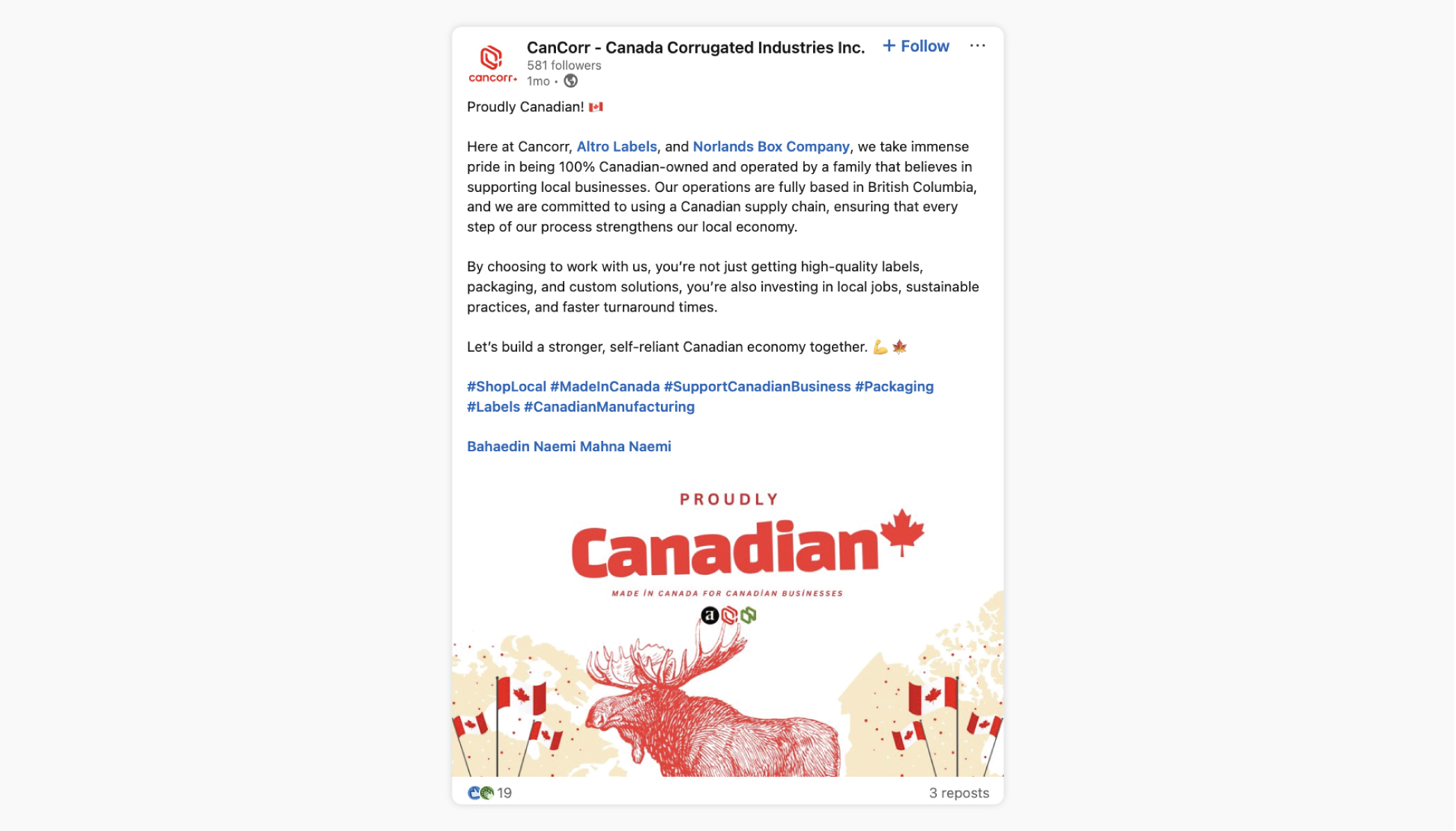5 brands nailing empathetic B2B marketing
By: Sydney Bokla
April 2, 2025 | Reading Time: 6 mins
These days there are various tools and innovative technologies such as CRMs, social listening tools, and AI digital assistants all promising to help you better understand your customer. On top of that, countless tools and channels are promising to help you reach your audience. But sometimes, when we focus on where to show up, we forget the importance of how we are showing up. Sometimes you need to go back to the basics: empathy.
B2B buyers are human too
B2B marketing can get a reputation for being emotionless. In reality, B2B buyers are people, too. Like you and I, they are human (imagine that) and have emotions, stressors, and ambitions both professionally and personally. And often, things like trust, reputation, and brand perception can carry more weight than a small price difference. That’s why building brand equity isn’t just a “nice to have”—it’s essential. The moment you acknowledge the humanity of your audience is the moment your marketing will start to feel more personalized and more thoughtful. It will make your audience feel like you just get it.
So, if you’re looking for some inspiration to bring a little more empathy into your marketing strategy…
Here are five B2B campaigns that effectively use empathy:
1. Amazon Ads: Ads that work as hard as you do
How was empathy used?
Amazon Ads showcases a fictional sparkling water brand called Cheri. The team behind the brand pours their heart and soul into crafting the perfect campaign, only for it to end up on a billboard blocked by a tree and barely visible from a highway. Unfortunately, most marketers can probably relate to this in some way. It’s a clever yet funny way of saying, “We see you.” Amazon Ads isn’t just selling ad space here—they’re acknowledging the real struggles marketers face and showing that they get it. They understand your problem so well that they’ve created Amazon Ads as the solution. Lots of hard work goes into creating a campaign, don’t let it fail when it matters most. The campaign is smart, human, and serves as a reminder that when you speak to people’s experiences, your message hits harder.
Impact
- By tapping into the everyday struggles of business owners, the campaign resonated deeply, driving 700,000 visits to the Amazon Ads website.
- Successfully positioned Amazon Ads as the go-to solution for small and medium-sized businesses looking to scale.
2. Equitable: Moments Matter
How was empathy used?
Here at Stryve, we had the opportunity to work with the Canadian insurance company, Equitable, on a campaign called Moments Matter. The idea was rooted in a simple but powerful message: No matter where you are in your life—building a business, growing your family, planning for retirement or facing a major life change—Equitable is here to support you. As a life insurance provider, Equitable’s business is built around protecting what matters most to people. And that starts with understanding people and all the life moments that matter to them.
Something that set Equitable apart was that their employees genuinely care. There was a strong recurring theme around wanting to help others and showing up for life’s big (and small) moments. We leaned into that. Rather than leading with products or policies, we led with real people and real stories. The campaign featured actual Equitable employees sharing why they do what they do.
These weren’t polished scripts or rehearsed pitches but rather genuine heartfelt stories that showed the human side of the business. By highlighting relatable experiences from stakeholders across the organization, we invited audiences to connect emotionally. Through empathetic story-telling from personal moments, the brand showed they understand, care, and want to help others. And when people feel understood, they’re far more likely to trust, and ultimately, choose the brand. That’s empathy in action.
Impact
- Stronger engagement across marketing channels, with the videos driving higher-than-average view times and interactions.
- In total, the videos have received over 380,000 views to date on YouTube ( as of March 2025).
3. GSoft: Dear Canada
How was empathy used?
GSoft effectively leveraged empathy at every stage of research, messaging, and execution of its Dear Canada campaign. Their goal was to break through the impersonal nature of B2B marketing and connect with their target audience on a human level. They researched each company’s business, industry pain points, and internal challenges to craft highly relevant messages. They recognized that companies appreciate thoughtful engagement and ensured their messaging didn’t feel transactional, it felt helpful, human, and understanding, with a bit of humour sprinkled throughout.
Impact
- Website traffic from outside the province skyrocketed by 227%, more than double their original target.
- Of the 96 companies GSoft reached out to, 63 acknowledged receiving their personalized “cover letter,” leading to ongoing negotiations with the sales team.
- 278 job applications rolled in from outside Quebec—a first for the company—proving that bold, creative marketing attracts candidates too.
4. CanCorr: Proudly Canadian
How was empathy used?
It’s no secret that brands have been capitalizing on the #BuyCanadian movement by uniting Canadians through their patriotism amid high political tensions and tariffs. CanCorr’s Proudly Canadian campaign took an empathetic approach by acknowledging the shared challenges faced by both businesses and consumers during turbulent times.
Rather than simply promoting their products, CanCorr, along with Altro Labels and Norlands Box Company, connected with their audience on an emotional level by emphasizing their commitment to Canadian ownership, local jobs, and sustainable practices. The message speaks directly to the growing desire among consumers and businesses to support local and contribute to the Canadian economy. By aligning their brand with the everyday concerns and values of their audience, Cancorr positioned themselves not just as a supplier, but as a partner who genuinely cares about the community. That sense of shared purpose and pride is what makes the message feel authentic and impactful.
Impact
- Tapped into a shared sense of pride and purpose in an easy to execute manner.
- For a B2B company in the manufacturing and packaging space, the engagement on the post shows that the message resonated.
5. Adobe: Do you know what your marketing is really doing?
How was empathy used?
At its core, the campaign pokes fun at the chaos that often comes with unaligned marketing efforts, but it does so with a deep understanding of what marketers truly experience. By highlighting real pain points through humorous, dramatized scenarios, Adobe used emotional connection and empathy throughout this campaign to build trust and engagement with their audience. It’s a powerful strategy that flips the script: rather than selling a product, Adobe showed marketers that they get it. They understand the confusion, the pressure, and the endless customer questions, and they’ve built the tools to help alleviate these pain points.
What made the campaign so effective was its ability to speak to marketers not just on a functional level, but on an emotional one. Adobe wasn’t just listing features or announcing a promotion—they were showcasing that they’d walked in their customers’ shoes. This empathy-based marketing strategy bridged the gap between data and human experience, helping businesses see the big picture of their customer journey. It gave a human face to complex technology and reminded marketers that they’re not alone in trying to make sense of customer feedback, conversion rates, and brand loyalty.
Impact
- The Click Baby Click commercial led to a remarkable 25% increase in subscriptions to Adobe’s Marketing Cloud suite.
- Beyond immediate engagement, the campaign’s impact extended to Adobe’s broader marketing initiatives. The relatable scenarios presented in the ads not only entertained but also educated marketers on the value of data-driven decision-making, reinforcing Adobe’s position as a leader in providing essential marketing tools.
Empathy is key to marketing
At the end of the day, empathy isn’t just a feel-good concept—it’s a powerful marketing strategy. Whether you’re selling software, packaging, or life insurance, the people at the other end of your campaign are still people. They have emotions, pressures, and goals, and they’re far more likely to connect with brands that get them.
Beyond the work you do, empathy can also impact how you do it. It impacts how you build relationships with your colleagues and is useful for ensuring you’re marketing accessibly. So next time you’re writing or creating a digital experience, take a step back and ask yourself: “Am I making this feel human?”. Because in B2B, empathy isn’t a soft skill—it’s a secret weapon.









